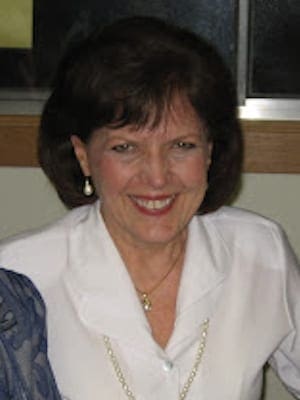Seminary “J-Terms” – three-week courses in January, June or July – are always intense, but the one I took in July 1987 was especially memorable.
Besides three hours of class daily, my professor required us to visit four churches, read four books, deliver a class presentation, write eight papers and complete a take-home final.
Unexpectedly, during the third week – when all assignments were due – the electricity went off for four days. This meant no lights, alarm clock, computer, air conditioning, hot water or hair dryer.
Thankfully, the good folks at the church where I served as associate minister of music had a soft spot in their hearts for poor, struggling seminary students.
They graciously took me under their wing and helped me survive the week, offering an abundance of assistance and sympathy for my complaints about this extreme hardship.
When the ordeal was finally over, I had a three-week pile of dirty laundry to wash.
As I sat drying towels in a nearby Laundromat, I was startled by a harsh, loud voice. Looking up, I saw two older ladies struggling to do their laundry. My eyes were riveted on their neediness.
Both were shabbily dressed with sweaty, unkempt hair. The younger one wore a tattered housedress and had bright, pasty rouge spackled on her cheeks. A dazed, vacant look on her shiny face, she took quick, tiny steps as she hobbled about, dragging her laundry bag to an empty washer.
The other – the one giving orders – was literally bent horizontal from her hips to her shoulders. She couldn’t even straighten up enough to see if the washer lid was open. If I were in her condition, I’m sure I would have spoken gruffly, too.
Obviously, just doing laundry was a major struggle for them, and they seemed to cling to each other for survival.
The manager was busily making change, giving them his full attention and seemed to have everything covered efficiently. They had obviously been his customers before.
I continued flipping through my magazine, keeping an eye out for an opportunity to assist without intruding.
Finally, they got their machines started and sat down to wait. The manager took a couple of drags on a cigarette and then came over to talk to me.
Venting sarcastically, he spoke of “the good church people who always drop these old ladies off in the middle of the parking lot, then drive off to go tell everyone at their church what a good deed they’ve done for the week.”
Sympathizing, I commented that instead of people going the second mile, some only go half a mile.
This was easy for me to say to sympathize with the manager who was feeling dumped on.
But the driver had at least provided transportation while I hadn’t done anything to help.
As a result, I began feeling ashamed for complaining earlier about my so-called “extreme hardship.”
As Thanksgiving approaches, I am reminded of how grateful I am for the many good church people who so often have gone way beyond the second mile to see that I am comfortable and well cared for.
And I am humbled and challenged as I remember how often I’ve been more like these good church people who had really good intentions, but ultimately went only a half-mile or less in taking care of others’ needs – especially the downtrodden who have no resources to return the favor.
As Christians, we strive to live humble lives of gratitude. God is pleased when we verbally offer heartfelt thanks for our many blessings, but there is more to being thankful. We are not done.
Our words of sincere thanks and praise to God are only the half-mile mark of what God desires from us. Our expressions of gratitude are not complete until we have also offered God tangible sacrifices of praise and thanksgiving.
What kinds of sacrifices? Generosity. Tithes and offerings. Good works. Going the second mile for those who are needy.
The writer of Hebrews put it well: “Do not neglect to do good and to share what you have, for such sacrifices are pleasing to God” (Hebrews 13:16). The writer of Ephesians said much the same: “For we are … created in Christ Jesus for good works, which God prepared beforehand to be our way of life” (Ephesians 2:10).
In this season of Thanksgiving, may God help us to remember that the depth of our gratitude is always revealed more by our actions than by our words.
As Grace Noll Crowell put it so well in her hymn, “Because I Have Been Given Much:”
Because love has been lavished so upon me, Lord,
A wealth I know that was not meant for me to hoard,
I shall give love to those in need,
Shall show that love by word and deed:
Thus shall my thanks be thanks indeed.
Naomi K. Walker is music/worship pastor at Immanuel Baptist Church in Frankfort, Ky. She blogs at Worship, Music and Beyond and Notations, and you can follow her on Twitter @NaomiKingWalker.
Naomi K. Walker is an ordained Baptist minister. Now retired, she served as music/worship pastor at Immanuel Baptist Church in Frankfort, Kentucky, from 1995 to 2017.

